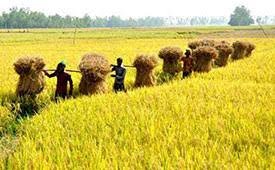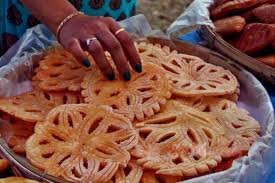 is a country where colorful festivals are held all year round in an appropriate manner and with great zeal and enthusiasm. With changes in social and economic structures, the nature of festivals also changes. But some festivals are so deeply rooted in the social organism that they continue to entertain people from generation to generation. Some of the festivals bear the mark of the community and the nation, some have the stamp of religion and, again, some bear the imprint of politics. The festivals, which evolved in the primitive society of prayer for food, have now become varied and colorful
is a country where colorful festivals are held all year round in an appropriate manner and with great zeal and enthusiasm. With changes in social and economic structures, the nature of festivals also changes. But some festivals are so deeply rooted in the social organism that they continue to entertain people from generation to generation. Some of the festivals bear the mark of the community and the nation, some have the stamp of religion and, again, some bear the imprint of politics. The festivals, which evolved in the primitive society of prayer for food, have now become varied and colorful
 main base of the festivals is the ritual and most of the ancient rituals were collective activities. Many of the rituals were related to agriculture and their dates were determined according to the lunar calendar. The ancient rituals were magical processes to master the supernatural powers; in subsequent crops, this characteristic trait was generally maintained. The spontaneous ancient festivals based on agriculture lost their spontaneity with the passage of time and became more formal.
main base of the festivals is the ritual and most of the ancient rituals were collective activities. Many of the rituals were related to agriculture and their dates were determined according to the lunar calendar. The ancient rituals were magical processes to master the supernatural powers; in subsequent crops, this characteristic trait was generally maintained. The spontaneous ancient festivals based on agriculture lost their spontaneity with the passage of time and became more formal.
 is the main profession of this town in the country. The majority of people depend on agriculture, especially the rural population. Around 60-70% of people depend on agriculture. Agriculture is the backbone of the economy of this country, so agriculture is of great importance in the economy of Bangladesh. Paddy (Dhan) is the main crop grown by farmers in this country. Nobanno Utshob is one of the popular cultural and traditional festivals in this country. This festival is also known as the New Harvest Festival. The Bengali terms Nobanno mean 'New rice' or 'New harvest'. The main new rice arrives in the Bengali month of Agrayhan and the festival takes place in the latter part of the month.
is the main profession of this town in the country. The majority of people depend on agriculture, especially the rural population. Around 60-70% of people depend on agriculture. Agriculture is the backbone of the economy of this country, so agriculture is of great importance in the economy of Bangladesh. Paddy (Dhan) is the main crop grown by farmers in this country. Nobanno Utshob is one of the popular cultural and traditional festivals in this country. This festival is also known as the New Harvest Festival. The Bengali terms Nobanno mean 'New rice' or 'New harvest'. The main new rice arrives in the Bengali month of Agrayhan and the festival takes place in the latter part of the month.
 . It is the happiest day for the rural population because in this period of time they take their livelihood to their homes. Since ancient times, Bengalis celebrate this festival with joys and hopes. Bengali people generally celebrate this Harvest Festival with food, music and dance and on this day they also wear traditional dresses. The villagers welcome their neighbors and guests with chira, murri and many types of pittha (homemade cakes). They also wear traditional dresses such as those of men, Lungi, Panjabi, Dhuti, etc., and women wear Sharee with different local cosmetics, flowers, tips, etc. In the past, this festival is only celebrated by the country people, but nowadays, this festival is also celebrated by urban people.
. It is the happiest day for the rural population because in this period of time they take their livelihood to their homes. Since ancient times, Bengalis celebrate this festival with joys and hopes. Bengali people generally celebrate this Harvest Festival with food, music and dance and on this day they also wear traditional dresses. The villagers welcome their neighbors and guests with chira, murri and many types of pittha (homemade cakes). They also wear traditional dresses such as those of men, Lungi, Panjabi, Dhuti, etc., and women wear Sharee with different local cosmetics, flowers, tips, etc. In the past, this festival is only celebrated by the country people, but nowadays, this festival is also celebrated by urban people.



 . It is the happiest day for the rural population because in this period of time they take their livelihood to their homes. Since ancient times, Bengalis celebrate this festival with joys and hopes. Bengali people generally celebrate this Harvest Festival with food, music and dance and on this day they also wear traditional dresses. The villagers welcome their neighbors and guests with chira, murri and many types of pittha (homemade cakes). They also wear traditional dresses such as those of men, Lungi, Panjabi, Dhuti, etc., and women wear Sharee with different local cosmetics, flowers, tips, etc. In the past, this festival is only celebrated by the country people, but nowadays, this festival is also celebrated by urban people.
. It is the happiest day for the rural population because in this period of time they take their livelihood to their homes. Since ancient times, Bengalis celebrate this festival with joys and hopes. Bengali people generally celebrate this Harvest Festival with food, music and dance and on this day they also wear traditional dresses. The villagers welcome their neighbors and guests with chira, murri and many types of pittha (homemade cakes). They also wear traditional dresses such as those of men, Lungi, Panjabi, Dhuti, etc., and women wear Sharee with different local cosmetics, flowers, tips, etc. In the past, this festival is only celebrated by the country people, but nowadays, this festival is also celebrated by urban people.
Hi! I am a robot. I just upvoted you! I found similar content that readers might be interested in:
http://independent-bangladesh.com/fairs-and-festivals/
hi I am steemit-xpert, I just upvoted. Please also upvote me
https://steemit.com/news/@steemit-xpert/top-general-says-he-d-push-back-against-illegal-nuclear-strike-order